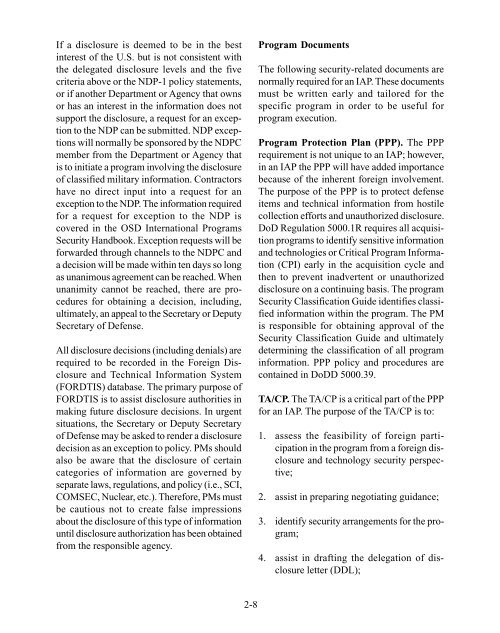Transatlantic Armaments Cooperation - Federation of American ...
Transatlantic Armaments Cooperation - Federation of American ...
Transatlantic Armaments Cooperation - Federation of American ...
You also want an ePaper? Increase the reach of your titles
YUMPU automatically turns print PDFs into web optimized ePapers that Google loves.
If a disclosure is deemed to be in the best<br />
interest <strong>of</strong> the U.S. but is not consistent with<br />
the delegated disclosure levels and the five<br />
criteria above or the NDP-1 policy statements,<br />
or if another Department or Agency that owns<br />
or has an interest in the information does not<br />
support the disclosure, a request for an exception<br />
to the NDP can be submitted. NDP exceptions<br />
will normally be sponsored by the NDPC<br />
member from the Department or Agency that<br />
is to initiate a program involving the disclosure<br />
<strong>of</strong> classified military information. Contractors<br />
have no direct input into a request for an<br />
exception to the NDP. The information required<br />
for a request for exception to the NDP is<br />
covered in the OSD International Programs<br />
Security Handbook. Exception requests will be<br />
forwarded through channels to the NDPC and<br />
a decision will be made within ten days so long<br />
as unanimous agreement can be reached. When<br />
unanimity cannot be reached, there are procedures<br />
for obtaining a decision, including,<br />
ultimately, an appeal to the Secretary or Deputy<br />
Secretary <strong>of</strong> Defense.<br />
All disclosure decisions (including denials) are<br />
required to be recorded in the Foreign Disclosure<br />
and Technical Information System<br />
(FORDTIS) database. The primary purpose <strong>of</strong><br />
FORDTIS is to assist disclosure authorities in<br />
making future disclosure decisions. In urgent<br />
situations, the Secretary or Deputy Secretary<br />
<strong>of</strong> Defense may be asked to render a disclosure<br />
decision as an exception to policy. PMs should<br />
also be aware that the disclosure <strong>of</strong> certain<br />
categories <strong>of</strong> information are governed by<br />
separate laws, regulations, and policy (i.e., SCI,<br />
COMSEC, Nuclear, etc.). Therefore, PMs must<br />
be cautious not to create false impressions<br />
about the disclosure <strong>of</strong> this type <strong>of</strong> information<br />
until disclosure authorization has been obtained<br />
from the responsible agency.<br />
2-8<br />
Program Documents<br />
The following security-related documents are<br />
normally required for an IAP. These documents<br />
must be written early and tailored for the<br />
specific program in order to be useful for<br />
program execution.<br />
Program Protection Plan (PPP). The PPP<br />
requirement is not unique to an IAP; however,<br />
in an IAP the PPP will have added importance<br />
because <strong>of</strong> the inherent foreign involvement.<br />
The purpose <strong>of</strong> the PPP is to protect defense<br />
items and technical information from hostile<br />
collection efforts and unauthorized disclosure.<br />
DoD Regulation 5000.1R requires all acquisition<br />
programs to identify sensitive information<br />
and technologies or Critical Program Information<br />
(CPI) early in the acquisition cycle and<br />
then to prevent inadvertent or unauthorized<br />
disclosure on a continuing basis. The program<br />
Security Classification Guide identifies classified<br />
information within the program. The PM<br />
is responsible for obtaining approval <strong>of</strong> the<br />
Security Classification Guide and ultimately<br />
determining the classification <strong>of</strong> all program<br />
information. PPP policy and procedures are<br />
contained in DoDD 5000.39.<br />
TA/CP. The TA/CP is a critical part <strong>of</strong> the PPP<br />
for an IAP. The purpose <strong>of</strong> the TA/CP is to:<br />
1. assess the feasibility <strong>of</strong> foreign participation<br />
in the program from a foreign disclosure<br />
and technology security perspective;<br />
2. assist in preparing negotiating guidance;<br />
3. identify security arrangements for the program;<br />
4. assist in drafting the delegation <strong>of</strong> disclosure<br />
letter (DDL);
















